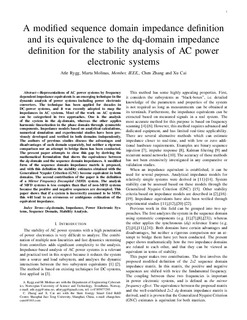| dc.contributor.author | Rygg, Atle | |
| dc.contributor.author | Molinas Cabrera, Maria Marta | |
| dc.contributor.author | Cai, Xu | |
| dc.contributor.author | Chen, Zhang | |
| dc.date.accessioned | 2017-05-16T11:55:55Z | |
| dc.date.available | 2017-05-16T11:55:55Z | |
| dc.date.created | 2016-12-09T07:50:14Z | |
| dc.date.issued | 2016 | |
| dc.identifier.citation | IEEE Journal of Emerging and Selected Topics in Power Electronics. 2016, 4 (4), 1383-1396. | |
| dc.identifier.issn | 2168-6777 | |
| dc.identifier.uri | http://hdl.handle.net/11250/2442647 | |
| dc.description.abstract | Representation of ac power systems by frequency-dependent impedance equivalents is an emerging technique in the dynamic analysis of power systems including power electronic converters. The technique has been applied for decades in dc-power systems, and it was recently adopted to map the impedances in ac systems. Most of the work on ac systems can be categorized into two approaches. One is the analysis of the system in the dq domain, whereas the other applies harmonic linearization in the phase domain through symmetric components. Impedance models based on analytical calculations, numerical simulation, and experimental studies have been previously developed and verified in both domains independently. The authors of previous studies discuss the advantages and disadvantages of each domain separately, but neither a rigorous comparison nor an attempt to bridge them has been conducted. This paper attempts to close this gap by deriving the mathematical formulation that shows the equivalence between the dq-domain and the sequence-domain impedances. A modified form of the sequence-domain impedance matrix is proposed, and with this definition the stability estimates obtained with the generalized Nyquist criterion become equivalent in both domains. The second contribution of this paper is the definition of a mirror frequency decoupled (MFD) system. The analysis of MFD systems is less complex than that of non-MFD systems because the positive and negative sequences are decoupled. This paper shows that if a system is incorrectly assumed to be MFD, this will lead to an erroneous or ambiguous estimation of the equivalent impedance. | |
| dc.language.iso | eng | |
| dc.publisher | IEEE | |
| dc.title | A Modified Sequence-Domain Impedance Definition and Its Equivalence to the dq-Domain Impedance Definition for the Stability Analysis of AC Power Electronic Systems | |
| dc.type | Peer reviewed | |
| dc.type | Journal article | |
| dc.source.pagenumber | 1383-1396 | |
| dc.source.volume | 4 | |
| dc.source.journal | IEEE Journal of Emerging and Selected Topics in Power Electronics | |
| dc.source.issue | 4 | |
| dc.identifier.doi | 10.1109/JESTPE.2016.2588733 | |
| dc.identifier.cristin | 1410465 | |
| dc.description.localcode | © 2016 IEEE. Personal use of this material is permitted. Permission from IEEE must be obtained for all other uses, in any current or future media, including reprinting/republishing this material for advertising or promotional purposes, creating new collective works, for resale or redistribution to servers or lists, or reuse of any copyrighted component of this work in other works | |
| cristin.unitcode | 194,63,25,0 | |
| cristin.unitname | Institutt for teknisk kybernetikk | |
| cristin.ispublished | true | |
| cristin.fulltext | postprint | |
| cristin.qualitycode | 1 | |
